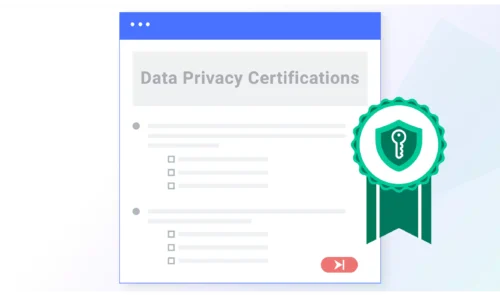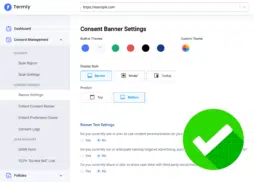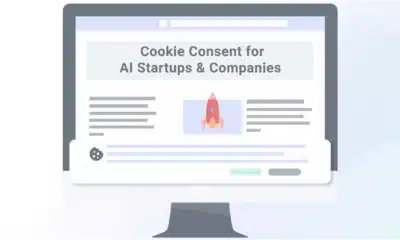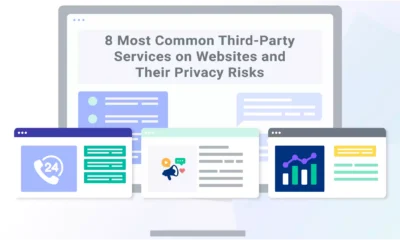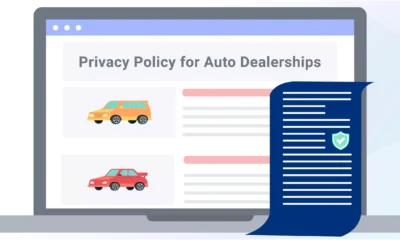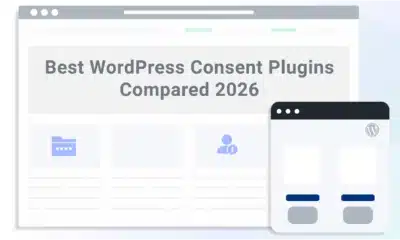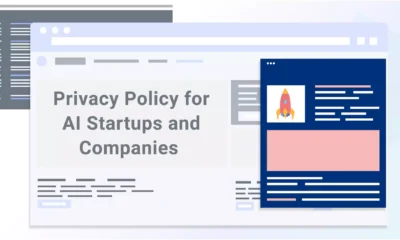No company can afford to collect personal data without proper safeguards, especially when a single data breach can lead to financial and reputational loss.
Professionals who understand data protection best practices are in high demand, as they help companies align with regulations and protect customer information.
Data privacy certifications help privacy professionals demonstrate their value.
In this article, we discuss the importance and benefits of data privacy certification and outline nine certifications you can earn to advance your career.
The Growing Demand for Data Privacy Certification
Companies are increasingly looking for data protection officers to help manage legal compliance and prevent cyberattacks — earning a data protection certification demonstrates the expertise you’ve acquired.
The U.S. Bureau of Labor Statistics predicts demand for privacy officers and information security analysts could grow 33% between 2023 and 2033.
That’s faster than the average growth rate for all other occupations!
Plus, new data privacy legislation gets introduced regularly; just check out our interactive U.S. data privacy law tracker map to explore some recent activity.
Because the industry is so fluid and relevant, the demand for privacy-certified professionals will continue to grow.
Benefits of Getting Certified in Data Privacy
Earning a data privacy certification — or any other type of compliance training — benefits you professionally by helping you:
- Gain experience in areas of study you may not be able to learn through work experience, like theoretical topics.
- Connect with other professionals in the industry who may become professional contacts or future colleagues.
- Boost confidence in your skills and improve your ability to perform well on the job.
Having an official certification also benefits the business you represent, because:
- A good reputation for protecting sensitive data encourages potential customers to do business with them.
- Companies strive to comply with privacy regulations and standards to increase credibility and avoid fines. Maintaining a comprehensive privacy policy, easily drafted with a privacy policy creation tool, ensures your organization’s data practices are clearly communicated to users.
- Your expertise will help ensure the business uses customer data legally and ethically.
- You’ll be better equipped to protect data to counteract issues like identity theft or fraud.
9 Data Privacy Certifications and How To Get Them
Now, let’s go over some of the best data privacy certifications available and explain what it takes to earn them.
Certified Information Privacy Professional (CIPP)
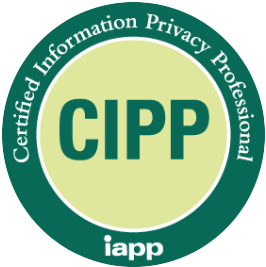
The International Association of Privacy Professionals (IAPP) offers comprehensive, up-to-date, and sought-after global privacy and data protection training and certification programs.
Their CIPP track focuses on the practical application of privacy laws and regulations.
Accreditation
CIPP is accredited and recognized by the America National Standard Institute’s National Accreditation Board (ANSI:ANAB) under the International Organization for Standardization (ISO) 17024:2012.
Who should get certified
The CIPP certification is recommended for data protection and security professionals responsible for information management, compliance, legal requirements, data governance, and human resources.
Because compliance regulations vary by location, the CIPP program offers five concentrations, each relevant to a specific global region:
- CIPP/A (Asia)
- CIPP/CN (China)
- CIPP/E (Europe)
- CIPP/US (United States)
- CIPP/C (Canada)
How to prepare and get certified
To obtain the CIPP certification, you must choose a concentration and pass a 2.5-hour, 90-question exam.
Preparation resources include:
- IAPP training courses (available online)
- Live online and in-person classroom formats
- Free study guides
- Training from official training partners.
Certified Information Privacy Manager (CIPM)
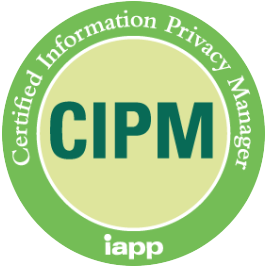
The IAPP also offers the CIPM certification, which focuses on developing, implementing, maintaining, and managing a privacy program.
Accreditation
The CIPM is accredited to ANSI:ANAB/ISO Standard 17024:2012.
Who should get certified
The CIPM certification is designed for professionals who implement and manage privacy regulations daily and those involved in:
- Risk management
- Privacy administration
- Auditing
- Privacy analysis
How to prepare and get certified
To get the CIPM certification, you must pass a 2.5-hour, 90-question exam by developing the following skills:
- Develop an organizational vision
- Organize a privacy team
- Create and execute a privacy program framework
- Communicate with various stakeholders
- Measure performance throughout the privacy program lifecycle
Preparation resources include:
- IAPP training courses
- Textbooks
- Free study guides
- Lessons from official training partners
- The Glossary of Privacy Terms
Certified Information Privacy Technologist (CIPT)
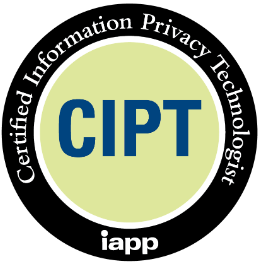
Another IAPP offering we recommend is the CIPT certification, which covers:
- Secure software products, processes, and services
- Skills required to protect data from any compromise
- The know-how to use new technologies to ensure customer privacy
Accreditation
The CIPT is accredited to ANSI:ANAB/ISO 17024:2012 standard.
Who should get certified
Completing the CIPT certification program is particularly useful for software development, information technology, and information security professionals because it focuses on understanding data privacy from a technology perspective.
How to prepare and get certified
To earn the CIPT certification, candidates must pass a 2.5-hour, 90-question exam, which includes two new objectives:
- Privacy engineering
- Privacy by Design methodology
Preparation resources include:
- IAPP training courses are available online and in in-person classroom formats
- Free study guides
- Training from official training partners
Artificial Intelligence Governance Professional (AIGP)
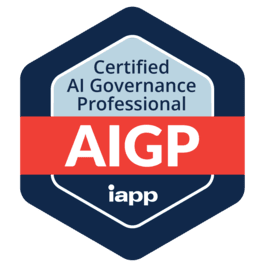
The Artificial Intelligence Governance Professional (AIGP) certification, introduced by the IAPP in 2024, is designed to equip professionals with the knowledge and skills necessary to ensure the ethical development, deployment, and management of AI systems.
Who should get certified
This certification is ideal for professionals tasked with implementing AI governance and risk management within their organizations.
How to prepare and get certified
To earn the AIGP certification, candidates must pass a 3-hour exam comprising 100 questions.
Preparation resources include:
- IAPP training courses available online and in-person.
- Free study guides covering AI governance frameworks and regulations.
- Practice exams offered through the IAPP store.
Certified Information Systems Security Professional (CISSP)
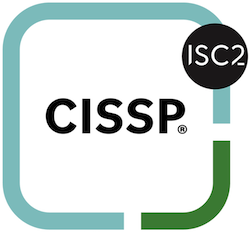
The CISSP certification, administered by the International Information System Security Certification Consortium (ISC2), helps professionals who design, implement, and manage cybersecurity programs demonstrate their knowledge, skills, and abilities.
Accreditation
The CISSP certification is accredited by the ANAB under the ISO/ISE standard 170245 and is approved by the U.S. Department of Defense (U.S. DoD) 8570.1.
Who should get certified
The CISSP certification is intended for cybersecurity professionals and leaders of information security programs.
How to prepare and get certified
To earn the CISSP certification, you must pass a six-hour exam with a score of 700 out of 1000 and demonstrate at least five years of cumulative work experience in two or more domains described in the ISC2 CISSP Common Body of Knowledge.
The ISC offers a range of exam preparation options, including:
- Instructor-led classroom
- Online training courses
- Self-study resources such as study guides, textbooks, and flashcards
- Practice tests
Notes on the HealthCare Information Security and Privacy Practitioner (HCISPP) certification
Previously, ISC2 offered the HealthCare Information Security and Privacy Practitioner (HCISPP) certification for information security professionals responsible for overseeing protected health information (PHI).
But after an internal review, ISC2 chose to sunset this certification, making it inactive as of 2026 (three years after the final exam in December 2023).
It’s replaced with Healthcare Certificates, which help individuals earn continuing professional education (CPE) credits.
Alternatively, the ISC2 recommends attaining their Certified in Cybersecurity (CC) certificate.
Certified Data Privacy Solutions Engineer (CDPSE)
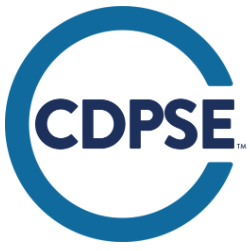
The Information Systems Audit and Control Association (ISACA) introduced the CDPSE — the first experience-based, technical certification in the privacy field.
Who should get certified
The CDPSE certificate is mainly for:
- Data analysts and scientists
- Architects of data protection solutions
- Compliance officers
- Software engineers
The program develops your ability to securely and comprehensively integrate privacy by design into your work, whether it’s making new technologies, products, or processes.
How to prepare and get certified
To apply for the certification, you must have at least five years of professional experience in at least two areas of the Exam Content Outline.
Holders of the CISA, CISM, CGEIT, CRISC, CSX-P, or FIP certifications are exempt from 2 years of professional experience.
These are cybersecurity-related certifications which you can earn by reviewing materials, enrolling in courses, and studying tips for taking the exams, like the ISACA CISA practice test, for example.
Preparation resources for the CDPSE include:
- The CDPSE Review Manual, available in print and electronic formats
- Additional learning tools such as questions, answers, and explanations (QAE)
- An online exam course
- Virtual training
Notes on the Certified Data Privacy Solutions Engineer (CDPSE) certification
ISACA has scheduled an update to the CDSPE Exam Content Outline, effective June 2, 2025. Updated preparation material will be available for purchase on April 2, 2025.
PECB Certified Data Protection Officer (CDPO)

The Professional Evaluation and Certification Board (PECB) offers Certified Data Protection Officer (CDPO) training.
It helps you develop the knowledge, skills, and competency necessary to become a Data Protection Officer (DPO) and implement a General Data Protection Regulation (GDPR) compliance program.
Accreditation
The CDPO certification is accredited to ISO/IEC 17024.
Who should get certified
If you want to become a DPO or specialize in the GDPR and have previous experience in data protection, this training course is designed for you.
How to prepare and get certified
To get certified as a GDPR CDPO with the PECB, candidates must:
- Pass an exam
- Have at least five years of professional experience (including at least two years in a data protection role)
- Complete 300 hours of data protection activities
- Sign the PECB Code of Ethics.
The PECB offers a course to prepare you for the Certified Data Protection Officer exam, which also includes a practical component.
Certified in Data Protection (CDP)
![]()
The Identity Management Institute’s CDP certification is a comprehensive program focusing on international security standards and data protection laws.
Who should get certified
The CDP is for professionals who want to learn about data protection practices for international security standards and privacy laws that apply to each stage of the data lifecycle.
How to prepare and get certified
To be eligible for certification, candidates must be members of the Identity Management Institute (IMI), an independent organization that develops and administers the CDP designation.
It uses the Critical Risk Domains (CRDs) to maintain the CDP training program and certify professionals worldwide and includes risk analysis and basic security concepts.
PrivacyTrust

For organizations, earning the PrivacyTrust certification shows your company passed PrivacyTrust’s privacy and data protection audits.
Who should get certified
PrivacyTrust is a data privacy certification for companies that want to build transparent customer relationships.
Seeing a PrivacyTrust seal on a website assures visitors that their personal data will not be shared with third parties.
How to prepare and get certified
Website owners usually complete certification within 12 business days and must renew yearly.
The group evaluates your application and privacy statement and, if you meet their privacy standards, awards you with certification and a validation link.
A data privacy certification benefits your career because of its authority and credibility.
The field of data privacy promises intellectual and professional growth — earning a privacy certification may be your ticket into the industry or pave the way for a career change.
Enrolling in a certification program puts you in an environment with other privacy professionals so you can network and possibly land that exciting career opportunity you’ve been waiting for!
Reviewed by Masha Komnenic CIPP/E, CIPM, CIPT, FIP Director of Global Privacy


